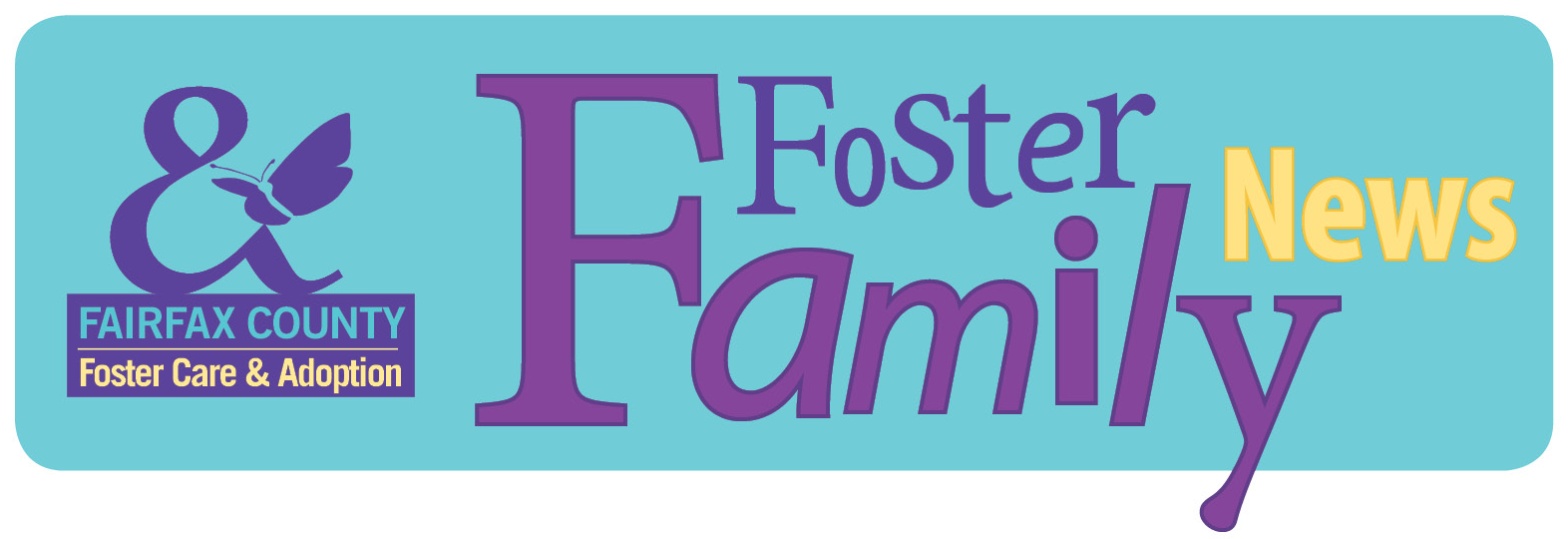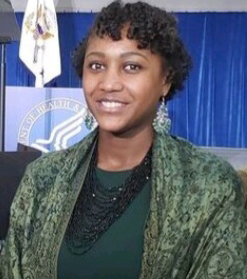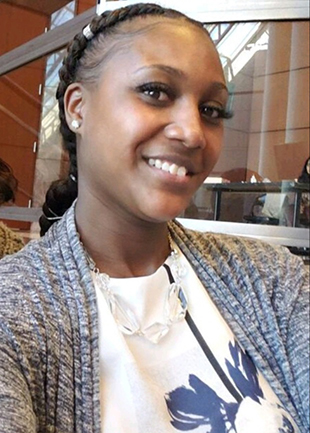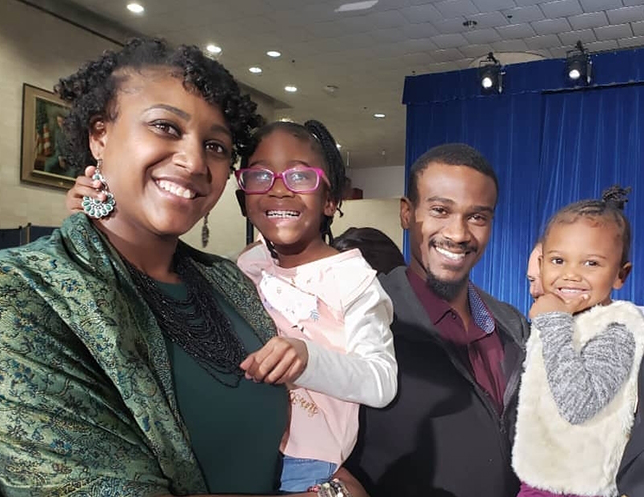
After spending most of her adolescence in foster care, La Tika was adopted at 21 years old. She is now a confident and outspoken advocate for foster care youth who has taken every opportunity to pursue her dreams. Below, she shares a little of her story and some encouragement for other youth in care.
Foster Family News: You gave a very powerful speech accepting the Fairfax County Board of Supervisors’ proclamation during Child Abuse Prevention Month in April. If it is not too uncomfortable to share, could you speak briefly about the circumstances that led to you coming into the Fairfax County foster care system?
 La Tika Jeffery: I went through a rough period in school as a teenager, and I revealed to my best friend that I was experiencing abuse at home. The next day, I was moved into foster care.
La Tika Jeffery: I went through a rough period in school as a teenager, and I revealed to my best friend that I was experiencing abuse at home. The next day, I was moved into foster care.
FFN: I understand that you entered foster care as a teenager. How old were you then, and how old are you now?
LJ: I was around 13 or 14 years old when I entered care, and now I am 30.
FFN: What happened once you were in care? Were you placed in a group home or a foster home? What were those experiences like for you?
LJ: Yes, I was placed in a foster home with a single African American woman. Going in, it was devastating. I felt like everything that I knew was taken away from me. I had never known my mother. I had only lived with my father who was a struggling artist, so we had bounced around from home to home for much of my life.
When I entered foster care, I had stability; but I missed my father, because he was everything that I knew. I had been led to believe that no one else would ever want me. Once I left him, I just felt uneasy.
FFN: So, you had a lot to overcome. Were you given support to help you with that?
LJ: It was offered, but at that time it was very difficult for me to open up and get the help I needed. I had a lot of embarrassment about the situation, and there was an ongoing court case against my abuser as well. I don’t believe that I’ve gotten as much help as I need, but I did attend therapy, and it was a start.
FFN: Were you in Fairfax County while all of this was going on?
LJ: Actually, I was in multiple foster homes. I was moved around a lot from county to county, and I attended more than one high school. In the end, I finally landed in a home in Fairfax County and graduated from Thomas Edison High School.
FFN: How did this impact your quality of education?
LJ: I was not the best student. I had a history of acting out, and I lacked the motivation to go on, so I slept a lot. It was difficult to deal with my circumstances. There were people who didn’t believe I had been abused, so I didn’t have the type of energy I needed to keep pushing on when the world was weighing me down.
FFN: So, what did you do after high school graduation?
LJ: Around that time, the foster parent I was living with stopped providing foster care. So, at 17 years old, I entered an independent living program in Fairfax. I was in IL until I was 19 or 20. I was working multiple jobs while attending college.
FFN: That sounds extremely stressful. Can you share what it was like?
LJ: In the IL program called LIFT, we were assigned roommates. Unfortunately, there were times that we didn’t always get along, and some of my things were stolen. It was stressful to worry about what was going on in my house while trying to keep up with classwork. Even though I received a stipend, it was barely enough when you calculated transportation, food, clothing, and other expenses. To afford a car for more stable transportation, would have required me to drop out of school or work 10 times harder.
 FFN: I understand that you were adopted at 21. Please tell us a bit about that experience of finding a family at that age.
FFN: I understand that you were adopted at 21. Please tell us a bit about that experience of finding a family at that age.
LJ: I really wanted to continue to grow independently, but it was very difficult with my limited budget. I reached out to the couple who would later become my parents and asked to stay with them. Around the time I was 19 or 20, I moved in with them. Eventually, they proposed adoption. It took an extended amount of time, and I ended up aging out of foster care before it was finalized at 21 years old.
FFN: How did you know the family that adopted you?
LJ: They are my best friend’s parents – the same friend who called the police about my abuse situation. We had stayed in touch all those years. They had been there helping to support me throughout the court case against my father, and they even testified in court. They understood the situation and knew the real me.
FFN: That must have been incredibly valuable to you.
LJ: Yes, I get very emotional even now. I spoke in Washington D.C. for National Adoption Month, and I started crying. It means so much to me that they knew my past, and I didn’t have to explain it or feel uneasy. They didn’t judge me. I just felt loved and welcomed by them.
FFN: When did you finish up with school?
LJ: It took me a few years, and there were a few stops along the way due to circumstances. I graduated from Northern Virginia Community College with my associate degree. I attended Florida Agricultural & Mechanical University for a couple of years and eventually moved back to this area. I graduated with my bachelor’s degree three years ago.
FFN: What is your life like now?
LJ: I am a stay-at-home mom to two girls, 6 and 3 years old, and a part time advocate for foster care and adoption.
FFN: What started you on the path to doing this advocacy, and what do you hope to accomplish by speaking out?
LJ: My husband and I have known each other since high school, and we are both so willing to help others. We both understand how it feels to have nothing. Our goal is always to empower others and keep them motivated. So right now, my main focus is continuing to support and mentor youth who are in foster care. I want to help them rise above the statistics on homelessness, incarceration, drug abuse, and other obstacles. I know it’s possible. I’ve been there; I’ve done it; and I’ve witnessed other people do it.
I want to give them hope, because when I was in foster care, I felt so alone. I felt embarrassed to share my story. I didn’t really understand too much about foster care at the time. We were in and out of other people’s homes, and people took us for granted. Not all foster homes are great, so I want to give hope to kids who are in foster care in Fairfax County. I’ve worked with more than six kids, and I am paired with a really great, positive, upbeat kid right now.
I want to show those kids that there is a brighter side and help them understand that even though they are in care, they can rise out, above, and on top?
FFN: Is this through a formal mentoring program with Fairfax County?
LJ: Yes, it’s the Youth Advocates for Fairfax County. Everyone in the program has been in foster care, and we mentor youth in foster care now. I have also participated in Kinship, Adoption, and PRIDE panels, and I was the kinship care guardian of my biological sister a few years ago. Now she is an adult.
 FFN: What are your goals for the future?
FFN: What are your goals for the future?
LJ: Eventually, I would like to start a non-profit around foster care.
FFN: Do you have any tips or lessons learned for youth in foster care now?
LJ: If you have a choice, stay in care. If you are in the system, and you have nowhere else to go and no plan, don’t be in a hurry to leave so soon out of spite.
It is important to use the resources that are available to you to give yourself an advantage instead of being resentful and rushing to get out. Be patient and make wise decisions that are in your own best interest.
Also, be your own voice. Don’t let others speak for you, and don’t be afraid to tell them what you need and want. Voice your needs and concerns in a respectful manner, because it’s important to lay that foundation now. If you don’t do that now, then you could miss out on some opportunities when you are out in the world.
Be open and honest with yourself. If you want to grow, that is really important.
Finally, be patient.
FFN: What’s your advice for people thinking about becoming foster parents or considering adoption?
LJ: Don’t take it personally. I understand that taking on the responsibility of someone else’s child is challenging, especially when you don’t always have legal guardianship of them. The kids have so many emotions and insecurities, and so much going on, but don’t take it personally. They are still learning, understanding, and developing. They just don’t always know how to express themselves well.
I had to learn this when I took on legal guardianship of my sister. At the time, I was 28. I had to do a lot of self-reflecting and understanding. I had to learn not to take things personally and accept that she might not be frustrated with me. Sometimes she just didn’t understand how to handle the situation.
Be patient. It may take them some time to trust you after bouncing from home to home.
If you plan for the relationship to go further, love unconditionally even in the good and the bad times. I think some people forget that foster kids need love. Sometimes it may be with a hug, sometimes it may be gifts. Make sure that you learn their love language, their ideal way to receive love, not yours. It’s very important, because once you build that relationship and trust, things can go a lot further between you. They will need you forever, and building that foundation now will allow them to be more comfortable looking back and reaching out to you.
This article posting is part of the Foster Family News monthly newsletter designed to keep foster parents informed about all the new and notable happenings in Fairfax County.
Learn about what the Foster Care & Adoption program has planned for foster families - stay on top of trends, participate in trainings and learn about policy changes.

